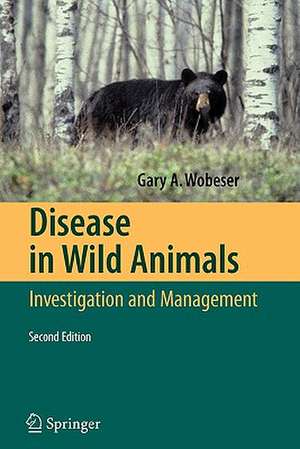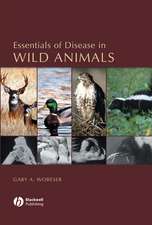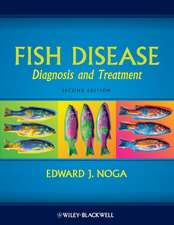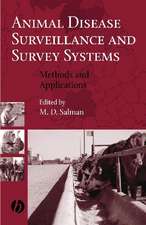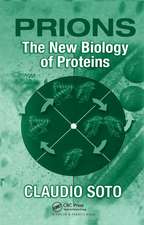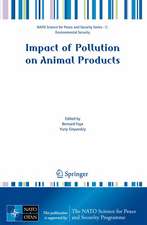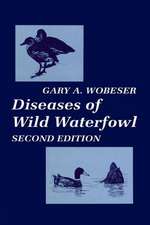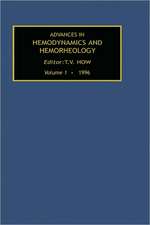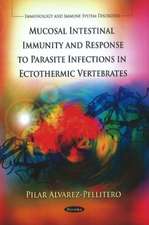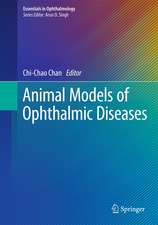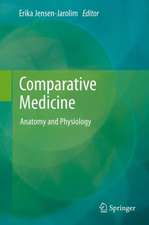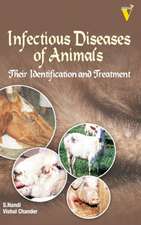Disease in Wild Animals: Investigation and Management
Autor Gary A. Wobeseren Limba Engleză Paperback – 14 oct 2010
| Toate formatele și edițiile | Preț | Express |
|---|---|---|
| Paperback (1) | 1783.87 lei 43-57 zile | |
| Springer Berlin, Heidelberg – 14 oct 2010 | 1783.87 lei 43-57 zile | |
| Hardback (1) | 1790.99 lei 43-57 zile | |
| Springer Berlin, Heidelberg – 12 mar 2007 | 1790.99 lei 43-57 zile |
Preț: 1783.87 lei
Preț vechi: 2175.44 lei
-18% Nou
Puncte Express: 2676
Preț estimativ în valută:
341.40€ • 354.62$ • 283.58£
341.40€ • 354.62$ • 283.58£
Carte tipărită la comandă
Livrare economică 03-17 februarie 25
Preluare comenzi: 021 569.72.76
Specificații
ISBN-13: 9783642080302
ISBN-10: 3642080308
Pagini: 404
Ilustrații: X, 393 p.
Dimensiuni: 155 x 235 x 21 mm
Greutate: 0.56 kg
Ediția:Softcover reprint of hardcover 2nd ed. 2007
Editura: Springer Berlin, Heidelberg
Colecția Springer
Locul publicării:Berlin, Heidelberg, Germany
ISBN-10: 3642080308
Pagini: 404
Ilustrații: X, 393 p.
Dimensiuni: 155 x 235 x 21 mm
Greutate: 0.56 kg
Ediția:Softcover reprint of hardcover 2nd ed. 2007
Editura: Springer Berlin, Heidelberg
Colecția Springer
Locul publicării:Berlin, Heidelberg, Germany
Public țintă
Professional/practitionerCuprins
Disease and epizootiology–basic principles.- Special problems in working with free-living animals.- Disease investigation.- Identifying and defining a disease.- Collecting population data.- Defining environmental factors.- Formulating and testing hypotheses.- Samples, sampling and sample collection.- Investigation of disease outbreaks and chronic or inapparent disease.- Records and recordkeeping.- Disease management.- Disease management–general principles.- Management of the causative agent/factor or its vector.- Disease management through manipulation of the host population.- Disease management through treatment and immunization.- Disease management through environmental modification.- Disease management through influencing human activities.- Emergency and integrated management programs.- Assessing the effectiveness of a disease-management program.
Recenzii
From the reviews of the first edition
"... has done an admirable job of outlining the problems associated with diagnosing and controlling disease in wildlife populations. ... The author has commendably presented a difficult topic and has shown that the usually successful approach to treating disease in domestic animals is extremely difficult and rarely successful in wildlife populations. ... I recommend this book to all who are looking for an introduction to the investigation and managment of disease in wildlife." (Canadian Veterinary Journal)
"... the author has made a major contribution to the field by providing a conceptual framework for wildlife disease investigations and by highlighting the inadequacies that often exist. His willingness to challenge dogma and constructively present perspectives based on a combination of extensive literature review, personal experiences, and beliefs is one of the values of this well organized and easy to read publication. ... this publication should be read by biologists, administrators, and disease specialists having responsibility for combatting disease in populations of free-living wildlife." (Journal of Wildlife Diseases)
"... has done an admirable job of outlining the problems associated with diagnosing and controlling disease in wildlife populations. ... The author has commendably presented a difficult topic and has shown that the usually successful approach to treating disease in domestic animals is extremely difficult and rarely successful in wildlife populations. ... I recommend this book to all who are looking for an introduction to the investigation and managment of disease in wildlife." (Canadian Veterinary Journal)
"... the author has made a major contribution to the field by providing a conceptual framework for wildlife disease investigations and by highlighting the inadequacies that often exist. His willingness to challenge dogma and constructively present perspectives based on a combination of extensive literature review, personal experiences, and beliefs is one of the values of this well organized and easy to read publication. ... this publication should be read by biologists, administrators, and disease specialists having responsibility for combatting disease in populations of free-living wildlife." (Journal of Wildlife Diseases)
Textul de pe ultima copertă
Wildlife diseases have become increasingly important recently due to their effect upon human health, veterinary medicine, wildlife, and conservation biology.
Gary Wobeser's successful book from 1994 has been completely updated and enlarged in a new second edition. An in-depth overview of the available techniques for the investigation and management of disease in free-ranging animals is provided. The subjects are illustrated with examples drawn from around the world, with emphasis on the special requirements involved in working with wild animals. Techniques are assessed critically with regard to their efficacy and effectiveness. The book draws on the author’s training as a wildlife biologist and veterinarian and his experience over four decades with wildlife disease.
From the reviews of the first edition
"... has done an admirable job of outlining the problems associated with diagnosing and controlling disease in wildlife populations. ... The author has commendably presented a difficult topic and has shown that the usually successful approach to treating disease in domestic animals is extremely difficult and rarely successful in wildlife populations. ... I recommend this book to all who are looking for an introduction to the investigation and managment of disease in wildlife." (Canadian Veterinary Journal)"... the author has made a major contribution to the field by providing a conceptual framework for wildlife disease investigations and by highlighting the inadequacies that often exist. His willingness to challenge dogma and constructively present perspectives based on a combination of extensive literature review, personal experiences, and beliefs is one of the values of this well organized and easy to read publication. ... this publication should be read by biologists, administrators, and disease specialists having responsibility for combatting disease in populations of free-living wildlife." (Journal of WildlifeDiseases)
Gary Wobeser's successful book from 1994 has been completely updated and enlarged in a new second edition. An in-depth overview of the available techniques for the investigation and management of disease in free-ranging animals is provided. The subjects are illustrated with examples drawn from around the world, with emphasis on the special requirements involved in working with wild animals. Techniques are assessed critically with regard to their efficacy and effectiveness. The book draws on the author’s training as a wildlife biologist and veterinarian and his experience over four decades with wildlife disease.
From the reviews of the first edition
"... has done an admirable job of outlining the problems associated with diagnosing and controlling disease in wildlife populations. ... The author has commendably presented a difficult topic and has shown that the usually successful approach to treating disease in domestic animals is extremely difficult and rarely successful in wildlife populations. ... I recommend this book to all who are looking for an introduction to the investigation and managment of disease in wildlife." (Canadian Veterinary Journal)"... the author has made a major contribution to the field by providing a conceptual framework for wildlife disease investigations and by highlighting the inadequacies that often exist. His willingness to challenge dogma and constructively present perspectives based on a combination of extensive literature review, personal experiences, and beliefs is one of the values of this well organized and easy to read publication. ... this publication should be read by biologists, administrators, and disease specialists having responsibility for combatting disease in populations of free-living wildlife." (Journal of WildlifeDiseases)
Caracteristici
An introduction to the techniques for the investigation of disease in free-ranging species Basic information on epidemiological techniques A critical review of the various forms of disease management used around the world Specific examples illustrating special features of both investigation and management Includes supplementary material: sn.pub/extras
